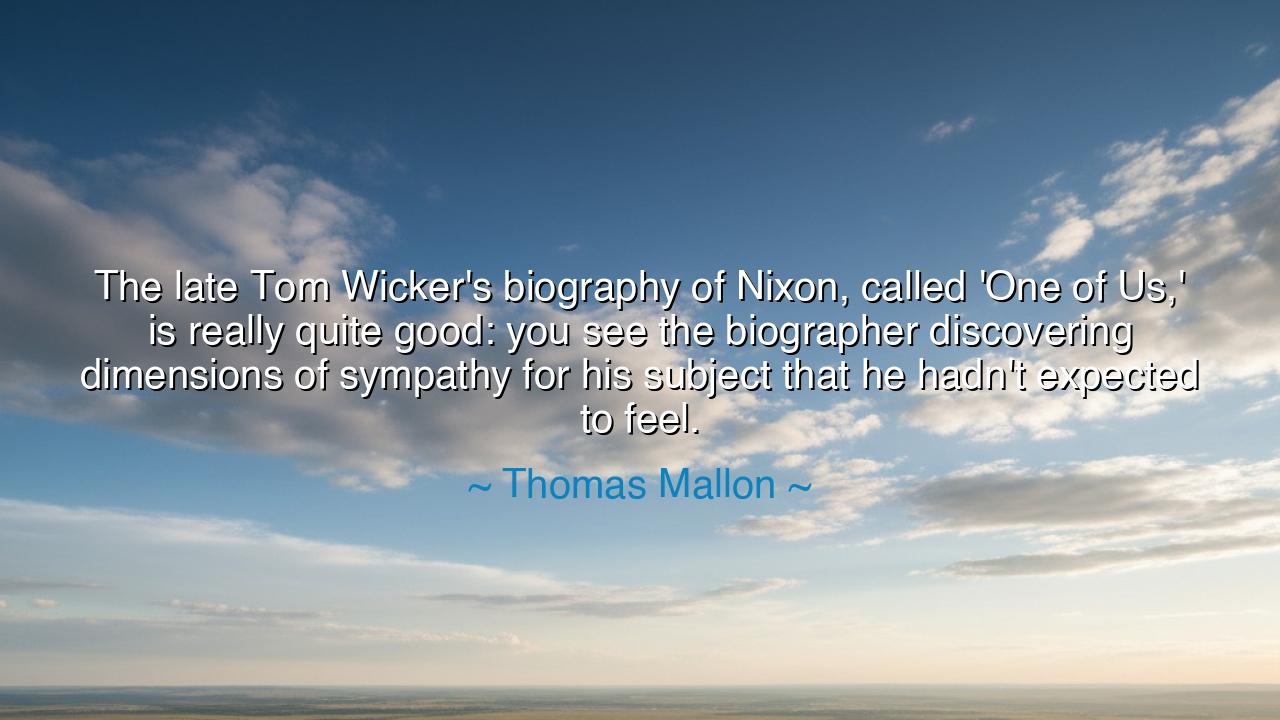
The late Tom Wicker's biography of Nixon, called 'One of Us,' is
The late Tom Wicker's biography of Nixon, called 'One of Us,' is really quite good: you see the biographer discovering dimensions of sympathy for his subject that he hadn't expected to feel.






When Thomas Mallon reflected, “The late Tom Wicker’s biography of Nixon, called One of Us, is really quite good: you see the biographer discovering dimensions of sympathy for his subject that he hadn’t expected to feel,” he unveiled a truth that lies deep in the art of storytelling and history alike: that to look long and honestly at another human being—even one wrapped in controversy—is to discover layers of humanity that surprise us. In this observation lies a lesson about sympathy, the power of perspective, and the humility that emerges when we see beyond our first judgments.
The biographer, unlike the polemicist, must walk alongside his subject not for a moment but for years. He must trace the arc of the life, from childhood dreams to final shadows. In this process, the subject ceases to be a caricature of public image and becomes instead a person of contradictions—fallible, striving, broken, yet recognizably human. Mallon points to Wicker’s biography of Richard Nixon, a man condemned by history for corruption and dishonor, yet one who, when studied in depth, reveals fears, insecurities, and ambitions that stir unexpected sympathy.
This phenomenon recalls the story of Julius Caesar, whose name has become synonymous with ambition and betrayal. For centuries, dramatists and historians painted him as tyrant or hero. Yet when Shakespeare penned his tragedy, he allowed Caesar’s fragility, his human need for loyalty and fear of mortality, to shine through. Audiences who entered the theater to condemn him often left with a complex sorrow for his fall. So too with Nixon: a man easily vilified in headlines becomes strangely pitiable when one beholds the fragile soul behind the mask of power.
What Mallon emphasizes is not the absolution of guilt, but the awakening of empathy. Wicker began his work as a journalist, accustomed to exposing Nixon’s faults, yet as he entered into the fullness of the man’s life, he discovered dimensions that demanded compassion. This is the irony of true engagement: the closer we come to another, the harder it becomes to hate them without remainder. Their sins may remain, their flaws undeniable, yet their humanity presses upon us, forcing us to recognize in them a distorted reflection of ourselves.
The lesson, O seekers of wisdom, is this: beware of holding too tightly to the comfort of one-dimensional judgments. It is easy to despise from a distance; it is harder to condemn once you have seen the full shape of a life. This does not mean we must excuse evil, but it does mean we must temper justice with understanding, lest we fall into the arrogance of believing ourselves wholly different from those we judge. Sympathy, even for the flawed, keeps our own humanity alive.
Practical action lies before you. When you encounter those you mistrust or dislike, resist the urge to define them solely by their worst deeds. If possible, learn their story, trace their struggles, seek the root of their choices. This does not erase their failings, but it may reveal the fears and wounds that drove them. In seeing these, you may cultivate not excuse, but compassion—the ability to recognize another as human, not merely as symbol.
Therefore, let Mallon’s reflection stand as a beacon: the act of truly beholding another often awakens sympathy where none was expected. Let us then seek not to flatten others into villains or saints, but to behold them in their fullness. For in doing so, we protect ourselves from cruelty, deepen our wisdom, and strengthen the bonds of shared humanity that endure even in the presence of failure. This, above all, is the gift of sympathy: it reminds us that the story of another is never finished until we have seen it whole.






AAdministratorAdministrator
Welcome, honored guests. Please leave a comment, we will respond soon